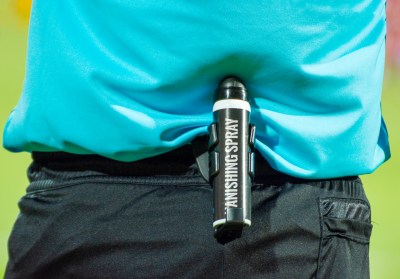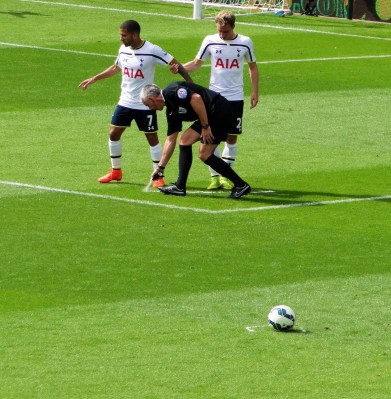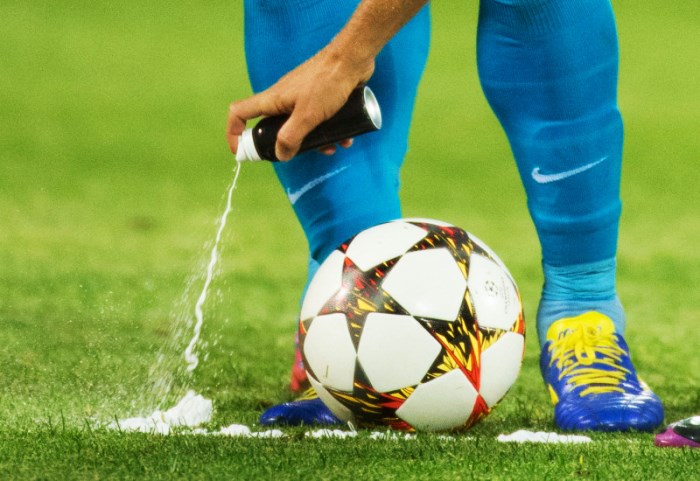We talk a lot about patent disputes in today’s high-tech world. Whether it’s Wi-Fi, 3D printing, or progress bars, patent disputes can quickly become big money—for lawyers and litigants alike.
Where we see less of this, typically, is the world of sports. And yet, a recent football innovation has seen plenty of conflict in this very area. This is the controversial story of vanishing spray.
Patently Absurd

You might have played football (soccer) as a child, and if that’s the case, you probably don’t remember vanishing spray as a key part of the sport. Indeed, it’s a relatively modern innovation, which came into play in international matches from 2013. The spray allowed referees to mark a line with a sort of disappearing foam, which could then be used to enforce the 10-yard distance between opposing players and the ball during a free kick.
The product is a fairly simple aerosol—the cans contain water, butane, a surfactant, vegetable oil, and some other minor constituents. When the aerosol nozzle is pressed, the liquified butane expands into a gas, creating a foam with the water and surfactant content. This creates an obvious white line that then disappears in just a few minutes.
The spray was created by Brazilian inventor Heine Allemagne in 2000, and was originally given the name Spuni. He filed a patent in 2000, which was then granted in 2002. It was being used in professional games by 2001, and quickly adopted in the mainstream Brazilian professional competition.
The future looked bright for Allemagne and his invention, with the Brazilian meeting with FIFA in 2012 to explore its use at the highest level of international football. In 2013, FIFA adopted the use of the vanishing spray for the Club World Cup. It appeared again in the 2014 World Cup, and many competitions since. By this time, it had been renamed “9.15 Fair Play,” referring to the metric equivalent of the 10-yard (9.15 meter) distance for free kicks.

The controversy came later. Allemagne would go on to publicly claim that the global sporting body had refused to pay him the agreed price for his patent. He would go on to tell the press he’d knocked back an initial offer of $500,000, with FIFA later agreeing to pay $40 million for the invention. Only, the organization never actually paid up, and started encouraging the manufacture of copycat products from other manufacturers. In 2017, the matter went to court, with a Brazilian ruling acknowledging Allemagne’s patent. It also ordered FIFA to stop using the spray, or else face the risk of fines. However, as is often the way, FIFA repeatedly attempted to appeal the decision, raising questions about the validity of Allemagne’s patent.
The case has languished in the legal system for years since. In 2020, one court found against Allemagne, stating he hadn’t proven that FIFA had infringed his products or that he had suffered any real damages. By 2022, that had been overturned on appeal to a higher court, which found that FIFA had to pay material damages for their use of vanishing spray, and for the loss of profits suffered by Allemagne. The latest development occurred earlier this year, with the Superior Court of Justice ruling that FIFA must compensate Allemagne for his invention. In May, CNN reported that he expected to receive $40 million as a result of the case, with all five ministers on the Superior Court ruling in his favor.
Ultimately, vanishing spray is yet another case of authorities implementing ever-greater control over the world of football. It’s also another sad case of an inventor having to fight to receive their due compensation for an innovative idea. What seems like an open-and-shut case nevertheless took years to untangle in the courts. It’s a shame, because what should be a simple and tidy addition to the world of football has become a mess of litigation that cost time, money, and a great deal of strife. It was ever thus.
Featured Image: Вячеслав Евдокимов, CC BY-SA 3.0
















Should have been red carded.
Maybe you should take a look at a guy named Nélio José Nicolai…
I know nothing of the facts of this case, but it’s certainly the type of scenario that comes to my mind when I hear people saying things like patents shouldn’t even exist.
You want a little inventor to not be able to protect his IP against a big organization? Seems ass backwards from the scenario most people think about when worrying about patent abuse.
Eh? You interpret that as me agreeing that patents should not exist? You think I side with the wealthy and powerful side?
Interesting take. In fact, I completely support the right of the little guy to protect his invention from those who would originate nothing yet own everything.
Yes. This is exactly the type of scenario that I raise when people say patents shouldn’t exist. It shows what can happen even when legal protection is in play. Without protection of some sort, the little guy is toast.
Except parents almost never protect the “little guy”, see this case among others. And in fact corporate patent hoarding and then licensing as an enforcement tactic across a whole industry is common practice, something the little guy can’t even start to engage with. Litigating patent infringements is also cost prohibitive unless you are a corporation. And this doesn’t even get into patent spam of every related concept with no actual development.
Something should be used to protect independent development, innovation add related investments, but patents and related organizations are notoriously bad at getting this right. As it is, they are necessary, but pretty evil simultaneously.
Hmm, someone should invent a method to protect independent innovation. Let’s call it “innovation protection bill” (IPB). Now, when it’s invented, should it’s inventor have patent for that method, or IPB would be enough?
You’re entirely right, patents are a tool. Some organizations use that tool to protect their profits, some small inventors use that tool to protect their profits. Probably a lot of people from football world would say that this one patent should be nullified, because it serves common good (shared culture).
So anything ever used for evil purposes shouldn’t exist? People that commit heinous crimes breathe air. Should we get rid of all of the air? Sure, that’s an absurd example, but it’s right where your logic leads.
So, not that I love the whole patent system. It’s horribly horribly broken.
But isn’t it the case that this guy came up with an interesting but easily reproducible idea that would only be of value if there’s a highly complex and restrictive patent system in place?
I mean it’s not like he invented some incredible new substance. He’s totally relying on the novelty non obvious requirement.
Why is anyone surprised that a complex highly complex and restrictive system would be easy to enforce?
I just don’t think there are any villains here.
The takeaway to me is the fundamental rule “patents are incredibly time consuming, expensive, confusing and often stupid and if you don’t have a fortune to prosecute or defend them, they’re largely worthless”?
Typo correction – “Why is anyone surprised that rights under a highly complex and restrictive system mostly now existing to protect very wealthy organizations would be hard to enforce?”
tbh when fifa are involved, you’ve always got to look at with a view that there’s almost certainly something shady going on there.
That’s where I settled. The product seems very similar to plain old canola spray, which would also produce a vanishing mark (with an oily residue I admit), but when it comes to FIFA I’m certain they’re either committing a crime or skirting it.
I do think there is a villain here, FIFA. Their whole goal here was to drag this out as long as possible in order to hopefully bankrupt him in the process. The court fees were likely less than the $40 million, in the mean time they got decades of use so the end result per year is far less than the original $40 million (assuming true, inflation has eaten away a lot of value).
That is FIFA’s mo, for sure. If they’re involved they are probably the bad guy.
If it’s such a silly little thing that requires no protection at all and is basically just a novelty. Why did no one come up with it except for this guy? And why did a multi-billion dollar sports organization not start using this substance until he presented it to them?
You can’t have it both ways. Either the product is basically worthless and could be made by anybody, in which case you should have already been making it and you should not need someone to introduce a patented item to you, or the invention has novel uses that are worthy of protection and you need to pay up if you violate those agreements.
The patent system isn’t broken. Governments are broken and beyond corrupt.
FIFA is just a bunch of greedy corrupt grifters; nothing new here.
40million is an absurd figure to ask for. Litigation is yet another cost to businesses.
If you ask for 40million they might as well spend 10million in court getting you to accept 5million. It’s always the way of these things.
I love the invention that said, but it’s not worth 40million by a long shot.
This.
At an estimated 2500 games per decade, that’s $8k / game, assuming 20 years.
It’s used in pretty much every league these days, so it’s gone way up and that will have come from fifa encouraging uefa and the national league organisations to follow suit too.
Yeah that’s what I thought.
How much is a referee or line-judge paid per game?
What would it cost to use a little bucket of sand to make a temporary line (noting it won’t fit in your back pocket)?
Maybe a can of shaving cream. Or whipped cream, IDK.
Canned whipped cream would probably be the best, non-toxic, will go away with no (very little) residue and delicious, it’s a good idea.
As I recall this was actually used for a while I’m some leagues, I have no idea why it’s not any more.
Or canned beer with co2 propellant. I think this invention can be easily bypassed by other material combination, so it isn’t worth $40M.
40mil is huge for a simple invention, but to FIFA, it’s, what, half a cheap footballer? I’m surprised they felt it was worth arguing over.
But then their initial 500k offer is also really high for a very simple idea, especially if you live in a country with a lower cost of living, so I’m kinda surprised he didn’t just take it.
$4M is absurd. I wouldn’t begrudge the guy a nice little earner, say $10K. The patent system is broken – it is more about Patent trolling and anti-competitive bastardry than encouraging invention. Lets not mention pharmaceutical patents.
I would just use shaving cream…
While it’s inherent cost is very little, What’s it’s value though. If FIFA directed referees to use it in every national and international cup game for the foreseeable future and they supply the foam at their own set cost, they stand to make a huge profit. 40m is probably about right! Granted i would be happy with just enough to live on comfortably but if I felt FIFA were making millions on the back of my idea, I would feel a bit duped for a while.
If I kept eating the food in your refrigerator but agreed to pay you $1M I would be a fool but I’d still have agreed to pay you.
Would you then feel justified in being upset if I didn’t pay you anything at all?
I wonder if this is some form of default reaction by the organization.
1.) we pay layers already.
2.) we stand to gain 39.5 million by not paying the agreed sum.
3.) worst case we have to pay the agreed amount.
This needs penalties. But outside the US those are never that big. I like US system, was good that Ford had to cough up 500mil for the exploding gas tanks. Would even be better with some corporate officer prison time, but that only applies to account keeping, after Enron.
Looks like shaving cream.
Soap on a playing field seems like a bad idea leading to very expensive injuries.
I thought that oil, water and surfactant was basically watered down soap?
I assume this combination has much less of the slippery soap effect and more of the bubbles effect.
It’s possible, just possible, that someone in FIFA, or even one of the other 8 billion people on the planet over the last twenty years may have had that thought, and tested it. And yet they continued using it despite litigation, so I’m being more than a little generous when I ask, are you serious?
Photo 2: That can ought to be labeled “BAT VANISHING SPRAY”
Could you not just use shaving cream?
It would kill the grass, be slippery, and you would have remnants.
Seriously?!?
Dead grass? It’s hardly slippery on a slick tile floor, granted I wear cleats while shaving. Pieces of carpet?
Oh my!
You forgot Argentina…
Things I learned today:
Football (soccer) has a ten yard rule for free kicks that in metric is called the 9.15 rule.
And all this time, I thought soccer was a euro invention that meant it was metric from the get go.
It was most likely invented and played before the metric system. (Probably before the imperial measurement system too for that matter)
Soccer was invented in the UK.
And the first standardisation of rules and pitch size was in England who also use the imperial system (which is where it gets its name from as it was the British Empire at the time)
As a referee instructor I can comment a lot on measurements in football.
They are ALL based on imperial bar one. (The one being distance from a Dropped Ball being 4 metres)
Surely that must have been 40 million quatloos. And anything that “is yet another case of authorities implementing ever-greater control over the world of football” must be adjudicated on HaD!
You are a true “Gamester” ….
Patent law like everything else in life the big guy usually wins. I had a friend who was one of IBM”s patent attorneys. He said that if somebody contacted IBM with and infringement notification IBM would look at the patent then tell the claimant to provide the address where IBM should direct a truck load of IBM payments they think that payment may infringe. The guy with the most patents always wins . At one time IBM held more patents than any other holder
“he expected to receive $40 million as a result of the case”
With interest, inflation and legal cost, right?
Or did he lose years of his time and money just to get the original agreed amount back that is now lower in value?
More of a contract dispute than patent infringement…
Did anyone else expect a mention of Wile E. Coyote & some sort of mail order “Acme Product” in this article?
I had a soccer coach use shaving foam for the same purpose about 35 years ago. Should he get 40mil too?
If he holds a patent for shaving foam I doubt he’d be chasing after pennies.
Wouldn’t this just make the field slippery with oil???